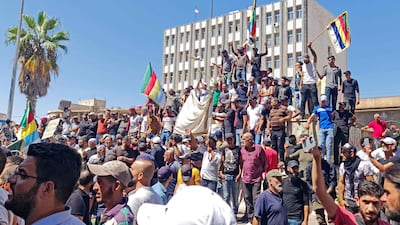Syrians are taking to the streets to demand the right to decide their own future without President Bashar Al Assad's regime, former opposition spokesman Yahya Al Aridi told The National on Friday.
Protests have intensified in recent days in the mostly Druze governorate of Suweida in south-west Syria, after erupting last Sunday following a decision by authorities to double fuel prices, adding to the dire cost-of-living crisis.
“The world is talking about how this regime is the main cause of the Syrian tragedy and there has to be a solution and it has to be a real implementation of UN Security Council Resolution 2254,” Mr Al Aridi said.
Resolution 2254 calls for the establishment of a credible, inclusive and nonsectarian governance; a process for drafting a new constitution; and free and fair elections under UN supervision.
The resolution includes a “political change with the Assad regime not being there and people especially being able to decide their own destiny”, Mr Al Aridi said.
Millions of people across the country have been struggling to afford basic goods for years due to hyperinflation, and anger over the government's decision to cut fuel subsidies is spreading.
For days, pictures and videos have circulated on social media calling for the removal of Mr Al Assad's from power. Demonstrators have been chanting “long live Syria and down with Al Assad”, echoing pro-democracy protests that started in 2011 and later spiralled into civil war.
The current protests are “an echo of what is happening in Syria, which is the rejection of the regime, that the regime can do nothing to change despite all the attempts to recycle it”, Mr Al Aridi said.
“It is a game – the regime is consistent with its basic motto of either ‘I rule it or ruin it’.
“Its behaviour inside towards its people has ruined it, has put it at an impasse – even those who helped it are unable to save it.”
The protests have spread to various cities, especially in the coastal areas, Mr Al Aridi said.
Protesters in that area predominantly come from the Alawite sect, known for their support of the government.
Suweida has remained in government hands during the conflict and its Druze minority has long resisted being drawn into the civil war that has pit the government against rebels drawn from Syria's majority Sunni population.
Syria is in the throes of a deep economic crisis that has led to its currency collapsing, leading to soaring prices for food and basic supplies that Mr Al Assad's government has blamed on western sanctions.
Residents of Suweida and the southern parts of the country are sending a strong message that no matter what the regime has done before and how it moves forward, they will not back down, Bente Scheller, head of the Middle East division at the Heinrich Boell Foundation, told The National.
“I think everybody in Syria is aware of what the consequences might be if you simply go out and protest, if you insist on your demands,” Ms Scheller said. “So I think it is really courageous.
“It is a sign that Mr Al Assad is not able to deliver any of the services that citizens expect even in the areas that have not been affected by the war that much.".














